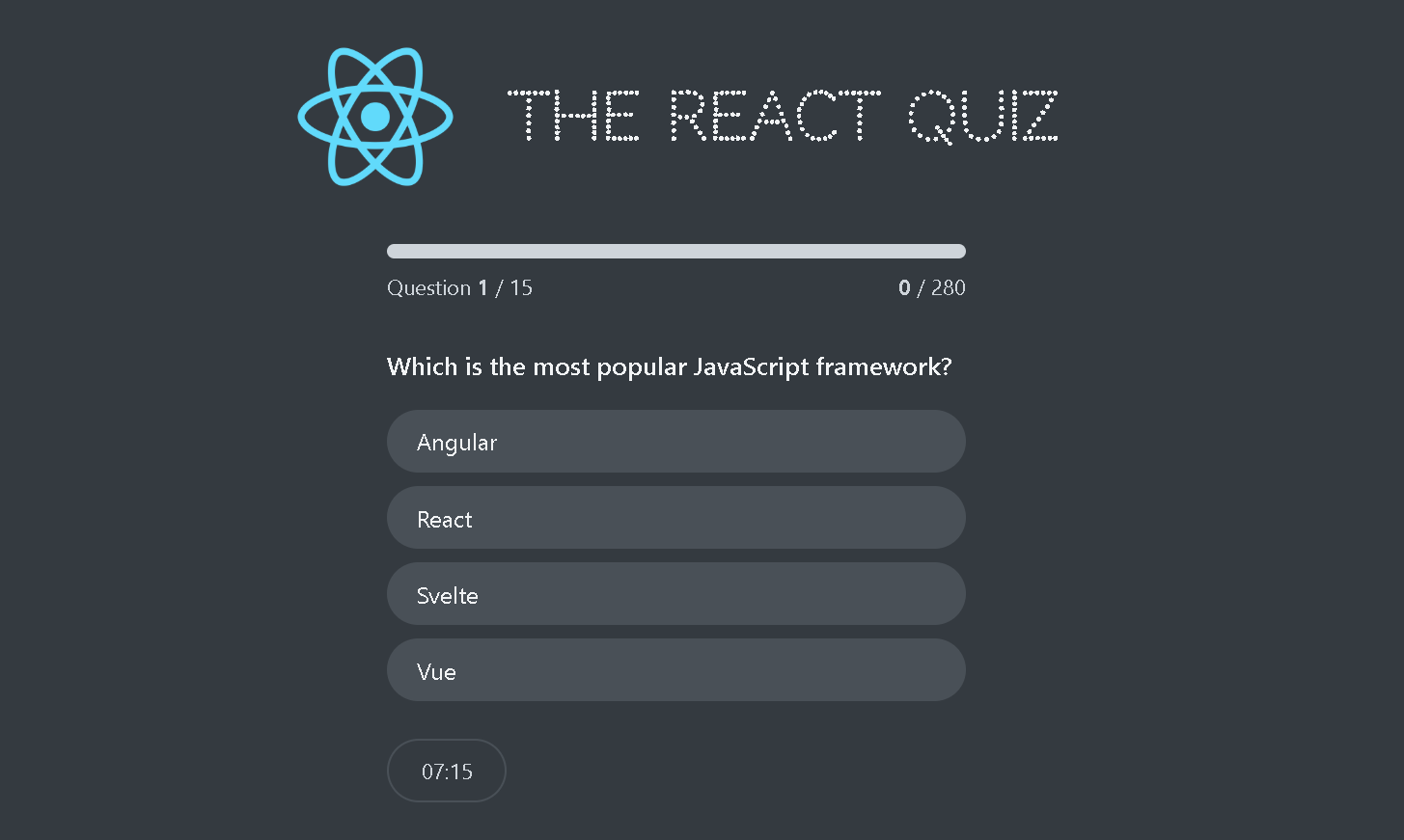import { createContext, useContext, useEffect, useReducer } from “react”;
const QuizContext = createContext();
const SECS_PER_QUESTION = 30;
const testQuestions = [
{
question: “Which is the most popular JavaScript framework?”,
options: [“Angular”, “React”, “Svelte”, “Vue”],
correctOption: 1,
points: 10,
},
{
question: “Which company invented React?”,
options: [“Google”, “Apple”, “Netflix”, “Facebook”],
correctOption: 3,
points: 10,
},
{
question: “What’s the fundamental building block of React apps?”,
options: [“Components”, “Blocks”, “Elements”, “Effects”],
correctOption: 0,
points: 10,
},
{
question:
“What’s the name of the syntax we use to describe the UI in React components?”,
options: [“FBJ”, “Babel”, “JSX”, “ES2015”],
correctOption: 2,
points: 10,
},
{
question: “How does data flow naturally in React apps?”,
options: [
“From parents to children”,
“From children to parents”,
“Both ways”,
“The developers decides”,
],
correctOption: 0,
points: 10,
},
{
question: “How to pass data into a child component?”,
options: [“State”, “Props”, “PropTypes”, “Parameters”],
correctOption: 1,
points: 10,
},
{
question: “When to use derived state?”,
options: [
“Whenever the state should not trigger a re-render”,
“Whenever the state can be synchronized with an effect”,
“Whenever the state should be accessible to all components”,
“Whenever the state can be computed from another state variable”,
],
correctOption: 3,
points: 30,
},
{
question: “What triggers a UI re-render in React?”,
options: [
“Running an effect”,
“Passing props”,
“Updating state”,
“Adding event listeners to DOM elements”,
],
correctOption: 2,
points: 20,
},
{
question: ‘When do we directly “touch” the DOM in React?’,
options: [
“When we need to listen to an event”,
“When we need to change the UI”,
“When we need to add styles”,
“Almost never”,
],
correctOption: 3,
points: 20,
},
{
question: “In what situation do we use a callback to update state?”,
options: [
“When updating the state will be slow”,
“When the updated state is very data-intensive”,
“When the state update should happen faster”,
“When the new state depends on the previous state”,
],
correctOption: 3,
points: 30,
},
{
question:
“If we pass a function to useState, when will that function be called?”,
options: [
“On each re-render”,
“Each time we update the state”,
“Only on the initial render”,
“The first time we update the state”,
],
correctOption: 2,
points: 30,
},
{
question:
“Which hook to use for an API request on the component’s initial render?”,
options: [“useState”, “useEffect”, “useRef”, “useReducer”],
correctOption: 1,
points: 10,
},
{
question: “Which variables should go into the useEffect dependency array?”,
options: [
“Usually none”,
“All our state variables”,
“All state and props referenced in the effect”,
“All variables needed for clean up”,
],
correctOption: 2,
points: 30,
},
{
question: “An effect will always run on the initial render.”,
options: [
“True”,
“It depends on the dependency array”,
“False”,
“In depends on the code in the effect”,
],
correctOption: 0,
points: 30,
},
{
question: “When will an effect run if it doesn’t have a dependency array?”,
options: [
“Only when the component mounts”,
“Only when the component unmounts”,
“The first time the component re-renders”,
“Each time the component is re-rendered”,
],
correctOption: 3,
points: 20,
},
];
const initialState = {
questions: [],
// ‘loading’, ‘error’, ‘ready’, ‘active’, ‘finished’
status: “loading”,
index: 0,
answer: null,
points: 0,
highscore: 0,
secondsRemaining: null,
};
function reducer(state, action) {
switch (action.type) {
case “dataReceived”:
return {
…state,
questions: action.payload,
status: “ready”,
};
case “dataFailed”:
return {
…state,
status: “error”,
};
case “start”:
return {
…state,
status: “active”,
secondsRemaining: state.questions.length * SECS_PER_QUESTION,
};
case “newAnswer”:
const question = state.questions.at(state.index);
return {
…state,
answer: action.payload,
points:
action.payload === question.correctOption
? state.points + question.points
: state.points,
};
case “nextQuestion”:
return { …state, index: state.index + 1, answer: null };
case “finish”:
return {
…state,
status: “finished”,
highscore:
state.points > state.highscore ? state.points : state.highscore,
};
case “restart”:
return { …initialState, questions: state.questions, status: “ready” };
case “tick”:
return {
…state,
secondsRemaining: state.secondsRemaining – 1,
status: state.secondsRemaining === 0 ? “finished” : state.status,
};
default:
throw new Error(“Action unkonwn”);
}
}
function QuizProvider({ children }) {
const [
{ questions, status, index, answer, points, highscore, secondsRemaining },
dispatch,
] = useReducer(reducer, initialState);
const numQuestions = questions.length;
const maxPossiblePoints = questions.reduce(
(prev, cur) => prev + cur.points,
0
);
useEffect(function () {
/*fetch(“http://localhost:9000/questions”)
.then((res) => res.json())
.then((data) => dispatch({ type: “dataReceived”, payload: data }))
.catch((err) => dispatch({ type: “dataFailed” }));*/
dispatch({ type: “dataReceived”, payload: testQuestions });
}, []);
return (
<QuizContext.Provider
value={{
questions,
status,
index,
answer,
points,
highscore,
secondsRemaining,
numQuestions,
maxPossiblePoints,
dispatch,
}}
>
{children}
</QuizContext.Provider>
);
}
function useQuiz() {
const context = useContext(QuizContext);
if (context === undefined)
throw new Error(“QuizContext was used outside of the QuizProvider”);
return context;
}
export { QuizProvider, useQuiz };

